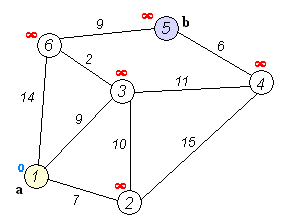typedef std::pair<int, int> edge;
typedef std::pair<int, int> element;
class compare {
public:
bool operator()(const element&a, const element &b) {
return a.second > b.second;
}
};
int dijkstra(const vector<vector<edge>> &graph, int source, int target,
vector<int> &path) {
int size = (int)graph.size();
if (!size) return -1;
if (source < 0 || source >= size || target < 0 || target >= size)
return -1;
vector<bool> visited(size, false);
vector<int> distance(size, INT_MAX);
vector<int> prev(size, -1);
path = prev;
distance[source] = 0;
priority_queue<element, vector<element>, compare> pq;
pq.emplace(make_pair(source, 0));
while (!pq.empty()) {
int v = pq.top().first;
pq.pop();
if (v == target) return distance[v];
if (visited[v]) continue;
for (auto &edge : graph[v]) {
int u = edge.first;
int w = edge.second;
if (visited[u]) continue;
if (distance[v] + w < distance[u]) {
distance[u] = distance[v] + w;
pq.emplace(make_pair(u, distance[u]));
path[u] = v;
}
}
visited[v] = true;
}
return -1;
}
int main(int argc, const char * argv[]) {
vector<vector<edge>> graph(7, vector<edge>());
graph[1].push_back(make_pair(3, 9));
graph[1].push_back(make_pair(2, 7));
graph[1].push_back(make_pair(6, 14));
graph[2].push_back(make_pair(1, 7));
graph[2].push_back(make_pair(3, 10));
graph[2].push_back(make_pair(4, 15));
graph[3].push_back(make_pair(1, 9));
graph[3].push_back(make_pair(6, 2));
graph[3].push_back(make_pair(4, 11));
graph[4].push_back(make_pair(2, 15));
graph[4].push_back(make_pair(3, 11));
graph[4].push_back(make_pair(5, 6));
graph[5].push_back(make_pair(6, 9));
graph[5].push_back(make_pair(4, 6));
graph[6].push_back(make_pair(1, 14));
graph[6].push_back(make_pair(3, 2));
graph[6].push_back(make_pair(5, 9));
vector<int> pre;
int shortestPath = dijkstra(graph, 1, 5, pre);
cout << "Shortest path from 1 to 5 has length of " << shortestPath << endl;
int u = 5;
stack<int> path;
while (pre[u] != -1) {
path.push(u);
u = pre[u];
}
path.push(u);
while (!path.empty()) {
cout << path.top() << " ";
path.pop();
}
return 0;
}
|
